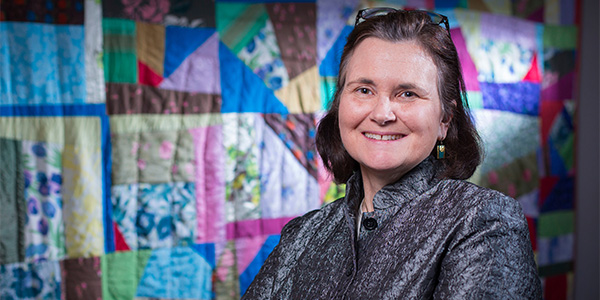
Discovering the Diversity of Life
Jo Anne Powell-Coffman heads a department with a charge to successfully teach and engage students in fundamentals of genetics and biology.
“But it’s not only a charge, it’s a privilege,” says Powell-Coffman, the chair of the Department of Genetics, Development and Cell Biology. “The students we teach are lives affected, not numbers.”
Powell-Coffman has been a member of the Iowa State faculty for nearly 20 years, and has served as department chair of GDCB since 2013. The department, coadministered by the College of Agriculture and Life Sciences and the College of Liberal Arts and Sciences, excels in biological discovery and making it relevant to undergraduate and graduate education.
GDCB is a key partner in delivering key courses for hundreds majoring in biology, genetics, bioinformatics and computational biology, and a major contributor to multiple interdisciplinary graduate programs.
“When you talk about departments with large teaching responsibilities and those with impressive research portfolios, GDCB’s identity is solidly in both camps,” she says. “We take pride in doing both well.”
GDCB faculty are constantly striving to understand what engages students, especially in introductory classes — the gateway courses that, if successful, can open eyes on promising career paths.
“One of our recent success stories is our genetics lab, which we transformed into an inquiry-based experience where students develop and test hypotheses and then present results to scientists in Iowa State’s biorenewable chemicals center. We want students to be invested in their experiments and the results, and help them be successful.”
Powell-Coffman sees GDCB at the hub the most challenging issues society faces, both in science and education.
“Our scientists work to understand how plants adapt to stress, changing climates and emerging disease and pest threats. They develop models to study human disease. They investigate the basic biology of nerves that may lead to new therapies that help people recover from peripheral nerve damage.”
With her administrative duties, Powell-Coffman does less research these days, but her scientific resume is formidable. One of her lab’s most significant contributions has been in understanding how organisms adapt to low-oxygen environments. In health and in disease, oxygen metabolism is central to everything. Her lab was the first to discover a genetic factor in C. elegans comparable to one in humans. The factor regulates gene expression in response to changing oxygen levels. The discovery opened the door to use genetic methods to find regulators of this factor. Labs around the world now are using her model to study and find regulators important to improving health or stymieing disease.
Powell-Coffman is enthused about the future for genetics and biological sciences. “With the incredible amount of data we’re able to generate, we now have the ability to analyze and truly begin to understand the diversity of life.”



